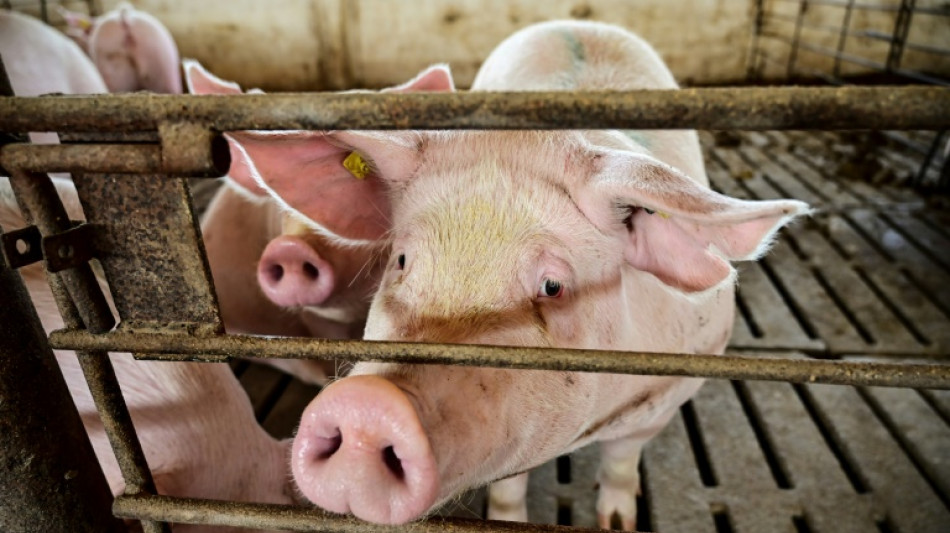
-
 German exports to US plunge as tariffs exact heavy cost
German exports to US plunge as tariffs exact heavy cost
-
Portugal heads for presidential vote, fretting over storms and far-right

-
 Suicide blast at Islamabad mosque kills at least 30, wounds over 130: police
Suicide blast at Islamabad mosque kills at least 30, wounds over 130: police
-
Russia says Kyiv behind Moscow shooting of army general

-
 Greenland villagers focus on 'normal life' amid stress of US threat
Greenland villagers focus on 'normal life' amid stress of US threat
-
Iran, US hold talks in Oman after Trump military threats

-
 Stocks waver as tech worries build
Stocks waver as tech worries build
-
Dupont, Jalibert click to give France extra spark in Six Nations bid

-
 'Excited' Scots out to prove they deserve T20 World Cup call-up
'Excited' Scots out to prove they deserve T20 World Cup call-up
-
EU tells TikTok to change 'addictive' design

-
 India captain admits 'there will be nerves' at home T20 World Cup
India captain admits 'there will be nerves' at home T20 World Cup
-
Stellantis takes massive hit for 'overestimation' of EV shift

-
 'Mona's Eyes': how an obscure French art historian swept the globe
'Mona's Eyes': how an obscure French art historian swept the globe
-
Iran, US hold talks in Oman

-
 Iran, US hold talks in Oman after deadly protest crackdown
Iran, US hold talks in Oman after deadly protest crackdown
-
In Finland's forests, soldiers re-learn how to lay anti-personnel mines

-
 Israeli president visits Australia after Bondi Beach attack
Israeli president visits Australia after Bondi Beach attack
-
In Dakar fishing village, surfing entices girls back to school

-
 Lakers rally to beat Sixers despite Doncic injury
Lakers rally to beat Sixers despite Doncic injury
-
Russian pensioners turn to soup kitchen as war economy stutters

-
 Japan taps Meta to help search for abuse of Olympic athletes
Japan taps Meta to help search for abuse of Olympic athletes
-
As Estonia schools phase out Russian, many families struggle

-
 Toyota names new CEO, hikes profit forecasts
Toyota names new CEO, hikes profit forecasts
-
Next in Putin's sights? Estonia town stuck between two worlds

-
 Family of US news anchor's missing mother renews plea to kidnappers
Family of US news anchor's missing mother renews plea to kidnappers
-
Spin woes, injury and poor form dog Australia for T20 World Cup

-
 Japan's Liberal Democratic Party: an election bulldozer
Japan's Liberal Democratic Party: an election bulldozer
-
Hazlewood out of T20 World Cup in fresh blow to Australia

-
 Japan scouring social media 24 hours a day for abuse of Olympic athletes
Japan scouring social media 24 hours a day for abuse of Olympic athletes
-
Bangladesh Islamist leader seeks power in post-uprising vote

-
 Rams' Stafford named NFL's Most Valuable Player
Rams' Stafford named NFL's Most Valuable Player
-
Japan to restart world's biggest nuclear plant

-
 Japan's Sanae Takaichi: Iron Lady 2.0 hopes for election boost
Japan's Sanae Takaichi: Iron Lady 2.0 hopes for election boost
-
Italy set for 2026 Winter Olympics opening ceremony

-
 Hong Kong to sentence media mogul Jimmy Lai on Monday
Hong Kong to sentence media mogul Jimmy Lai on Monday
-
Pressure on Townsend as Scots face Italy in Six Nations

-
 Taiwan's political standoff stalls $40 bn defence plan
Taiwan's political standoff stalls $40 bn defence plan
-
Inter eyeing chance to put pressure on title rivals Milan

-
 Arbeloa's Real Madrid seeking consistency over magic
Arbeloa's Real Madrid seeking consistency over magic
-
Dortmund dare to dream as Bayern's title march falters

-
 PSG brace for tough run as 'strange' Marseille come to town
PSG brace for tough run as 'strange' Marseille come to town
-
Japan PM wins Trump backing ahead of snap election

-
 AI tools fabricate Epstein images 'in seconds,' study says
AI tools fabricate Epstein images 'in seconds,' study says
-
Asian markets extend global retreat as tech worries build

-
 Sells like teen spirit? Cobain's 'Nevermind' guitar up for sale
Sells like teen spirit? Cobain's 'Nevermind' guitar up for sale
-
Thailand votes after three prime ministers in two years

-
 UK royal finances in spotlight after Andrew's downfall
UK royal finances in spotlight after Andrew's downfall
-
Diplomatic shift and elections see Armenia battle Russian disinformation

-
 Undercover probe finds Australian pubs short-pouring beer
Undercover probe finds Australian pubs short-pouring beer
-
Epstein fallout triggers resignations, probes


Scientists grow human-like kidneys in pigs
Chinese scientists have succeeded in growing kidneys containing human cells in pig embryos, a world first that could one day help address organ donation shortages.
But the finding, published in a study in the journal Cell Stem Cell on Thursday, raises ethical issues -- especially since some human cells were also found in the pigs' brains, experts said.
The researchers from the Guangzhou Institutes of Biomedicine and Health focused on kidneys because they are on the first organs to develop, and the most commonly transplanted in human medicine.
"Rat organs have been produced in mice, and mouse organs have been produced in rats, but previous attempts to grow human organs in pigs have not succeeded," senior author Liangxue Lai said in a statement.
"Our approach improves the integration of human cells into recipient tissues and allows us to grow human organs in pigs."
This is a different approach to the recent high-profile breakthroughs in the United States, where genetically modified pig kidneys and even a heart have been placed inside humans.
The new paper "describes pioneering steps in a new approach to organ bioengineering using pigs as incubators for growing and cultivating human organs," said Dusko Ilic, a professor of stem cell sciences at King's College London who was not involved in the research.
Ilic cautioned there would be many challenges to turning the experiment into a viable solution, but "nevertheless, this captivating strategy warrants further exploration."
- Gene editing -
A major challenge in creating such hybrids has been that pig cells outcompete human cells.
To overcome the obstacles, the team used CRISPR gene editing to delete two genes essential for kidneys to form inside a pig embryo, creating what's called a "niche."
They then added specially prepared human pluripotent stem cells -- cells that have the potential to develop into any cell type -- which filled the niche.
Before implanting the embryos in sows, they grew them in test tubes containing substances that nourished both the human and pig cells.
In total, they transferred 1,820 embryos into 13 surrogate mothers. The pregnancies were terminated at 25 and 28 days to assess how the experiment had worked.
Five embryos selected for analysis were found to have functionally normal kidneys for their stage of development. They contained between 50 and 60 percent human cells.
"We found that if you create a niche in the pig embryo, then the human cells naturally go into these spaces," said co-author Zhen Dai.
"We saw only very few human neural cells in the brain and spinal cord and no human cells in the genital ridge."
But the presence of any human cells in the pig brains raises concerns, said Darius Widera, a professor of stem cell biology at the University of Reading.
"Although this approach is a clear milestone and the first successful attempt to grow whole organs containing human cells in pigs, the proportion of human cells in the generated kidneys is still not high enough," he added.
In the long run, the team wants to optimize their technology for use in human transplantation, but admits it's not ready yet.
An important limitation was the kidneys had pig-derived vascular cells, which could cause rejection if transplanted into a human.
Nevertheless, the team is already working on growing other human organs in pigs such as the heart and pancreas.
H.Nasr--SF-PST



